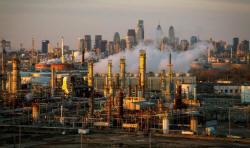Oil rises on IMF world growth outlook, OPEC-led supply
curbs
 Send a link to a friend
Send a link to a friend
 [January 23, 2018]
By Ahmad Ghaddar [January 23, 2018]
By Ahmad Ghaddar
LONDON (Reuters) - Oil prices rose on
Tuesday, lifted by healthy world economic growth prospects and
production curbs by OPEC, Russia and their allies.
Brent crude futures <LCOc1> were up 28 cents at $69.31 a barrel at 1018
GMT, not far off the three-year high of $70.37 reached on Jan. 15.
U.S. West Texas Intermediate (WTI) crude futures <CLc1> rose 33 cents to
$63.90 a barrel. WTI reached its highest since December 2014 on Jan. 16
at $64.89.
The International Monetary Fund on Monday revised upward its forecast
for world economic growth to 3.9 percent for both 2018 and 2019, a 0.2
percentage point increase from its last update in October.
"The IMF’s upward revision of its growth forecast is generating
tailwind," Commerzbank analysts said. "This further improves the already
fairly rosy demand prospects on the oil market."

The demand growth comes at a time of supply curbs by the Organization of
the Petroleum Exporting Countries, Russia and other producers, which
began in January 2017 and that are due to run until the end of 2018.
"The outlook for 2018 is roughly balanced for most of the year, but
inventories are set to rise in Q4 2018," French bank BNP Paribas said.
The bank said it had hiked its 2018 oil price forecasts by $10 a barrel,
expecting WTI to average $60 and Brent $65.
But there have been signs of a possible price correction.
[to top of second column] |

The Philadelphia Energy Solutions oil refinery owned by The Carlyle
Group is seen at sunset in front of the Philadelphia skyline March
24, 2014. Picture taken March 24, 2014. REUTERS/David M.
Parrott/File Photo

Crumbling refinery profits, first in Asia and now also in Europe and the
United States, as a result of rising feedstock prices and plentiful
availability of fuel products, point to lower crude orders going
forward.
Barclays said it expected Brent to average $60 a barrel this year, $5
above its previous forecast, due to strong demand growth and falling
output from OPEC-member Venezuela.
But the British bank said it had "a bearish view on oil prices for the
quarters ahead."
In the long-term, investors are preparing for a fall in oil demand due
to the rise of electric vehicles. Bank of America Merrill Lynch said it
saw "peak oil demand" by 2030, with electric vehicles replacing
conventional ones by 2050.
The bank said that when gasoline demand peaked by 2025 and oil demand
overall peaked by 2030, "refinery utilization rates may decline
permanently and refining margins suffer heavily."
(Additional reporting by Henning Gloystein in Singapore; Editing by
Edmund Blair)
[© 2018 Thomson Reuters. All rights
reserved.] Copyright 2018 Reuters. All rights reserved. This material may not be published,
broadcast, rewritten or redistributed.
 |